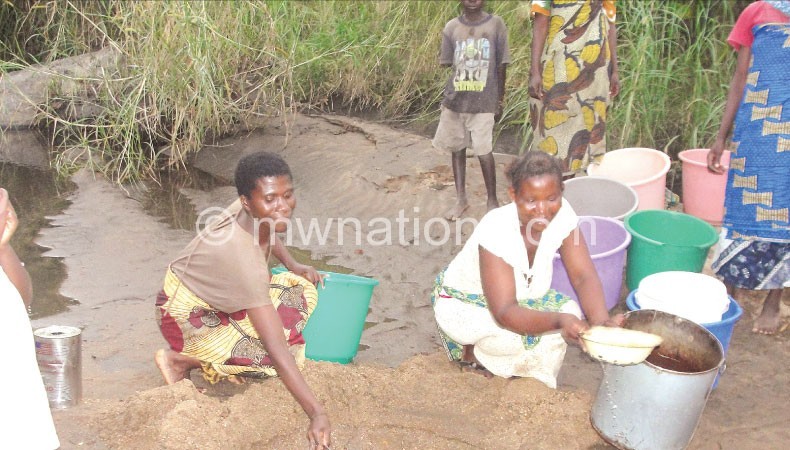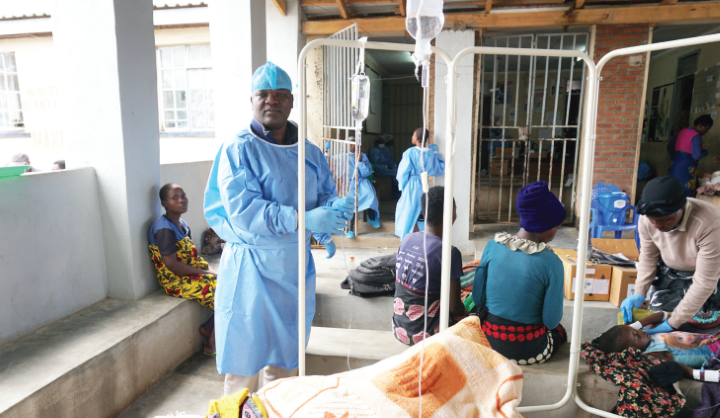Malawi misses sanitation deadline
Malawi is supposed to eliminate open defecation by December 2015 but, as JOHN CHIRWA writes, the deadline has been missed with only 19 percent of areas free from open defecation.
Ask Traditional Authority (T/A) Mwadzama, it is for observing good sanitation practices that he set foot in Senegal.
To some people in Nkhotakota where he reigns, a trip outside Malawi never comes on a silver platter. It is believed to be the work of black magic.
“People were asking me ‘which magician did you consult to be selected for the trip?’ But I told them it didn’t require me any magic. All I did was to implement everything I learnt about sanitation,” he explains.
His area, which has 10 793 villages, was the first out of six T/As in Nkhotakota to be declared open defecation free (ODF) by government in December last year. That is the reason he attended a sanitation conference in Senegal.
“When government briefed us about eliminating open defecation, I took the message seriously. I mobilised my subjects to debrief them about the need to have sanitary facilities.
“I decreed that any village head who fails to achieve ODF would be suspended, and would be reinstated after being declared ODF,” he explains.
Nkhotakota is one of the six districts where the Government of Malawi, with funding from the Global Sanitation Fund (GSF), is implementing a sanitation and hygiene project being executed by Plan Malawi.
The others are Rumphi, Balaka, Ntchisi, Chikwawa and Phalombe. In these districts, it is only T/As Kaduya in Phalombe, Sawali in Balaka and Chapinduka in Rumphi who have been declared ODF.
“If a mere village fails to achieve ODF, it means a T/A cannot be declared ODF,” says Elizabeth Chingayipe, principal environmental health officer in the Ministry of Health.
In Malawi, about 11 percent of the population is still practising open defecation, according to the 2008 National Statistical Office study.
This practice, if left unchecked, would continue to facilitate the transmission and prevalence of waterborne related diseases, states the study.
As such, government developed a strategy called ODF Malawi Strategy 2015 to completely eliminate open defecation in the country. The strategy aligns and harmonises sanitation and hygiene initiatives and interventions to meet the Millennium Development Goals (MDGs) of halving the number of people who do not have access to basic sanitation by 2015.
But government admits that the country has failed to achieve the target.
“Nationwide, we are 19 percent ODF. This means that we have failed to achieve the target,” admits Chingayipe.
Some Rumphi chiefs blame government for the failure.
Sub-T/A Njikula says government’s failure in providing them with water has frustrated efforts in achieving ODF.
“Issues of sanitation go hand-in-hand with water. My area is so mountainous such that people have challenges in accessing water. Even if we dig boreholes or wells we can’t find water. So, how do we achieve ODF status without water?” he wonders.
For those living along the lakeshore, they blame it on sandy terrain as a negative factor in sanitation issues.
“Even if we construct pit latrines, they fall down because we have a sandy earth which makes it difficult to construct strong pit latrines,” says T/A Mwamlowe from Rumphi.
He adds that there is a conflict between their by-laws and the country’s constitution.
“In my area, we set by-laws to fine anyone found defecating along the beaches. But people take us to court for violating their rights. For example, there was a case where we confiscated a fisherman’s net. He reported us to court and he won the case,” complains Mwamlowe.
There are also cultural issues that lead some people to shy away from having pit latrines. In Nsanje, for instance, some women are not allowed to use pit latrines.
But Chingayipe says issues raised by the chiefs are secondary to the main reason for Malawi to miss the deadline.
“The main problem is that we were too ambitious and unrealistic. We set the strategy in 2010, and yet we wanted to end ODF by 2015. It would not have been possible to achieve the target in such a small period,” she says.
Floods that ravaged most parts of the country, especially the Lower Shire have also been a contributing factor.
“There were some T/As who were about to be declared ODF. But floods swept away their pit latrines. As of now, they are starting all over again,” she says.
“It needs to be noted as well that it is all about changing the mindset if we are to achieve ODF status. People should know the importance of a pit latrine and why they should take care of it,” says Chingayipe.
In May this year, Malawi was one of the African countries at the Africa San4 Conference in Senegal.
The conference was convened by the Government of Senegal with support from the African Ministers’ Council on Water (Amcow) for African countries to share best practices in sanitation and hygiene.
The conference came up with a declaration, summarised as a vision, for African countries to achieve universal access to adequate and sustainable sanitation and hygiene and eliminate open defecation by 2030.
To realise this vision, the conference came up with 10 commitments to be upheld by member states.
Among other commitments, member states agreed to strengthen local structures in their respective countries after recognising the role that local leaders play in ensuring sanitation.
It was also agreed to establish and track sanitation and hygiene budget lines that consistently increase annually to reach a minimum of 0.5 percent of the national budget by 2020.





